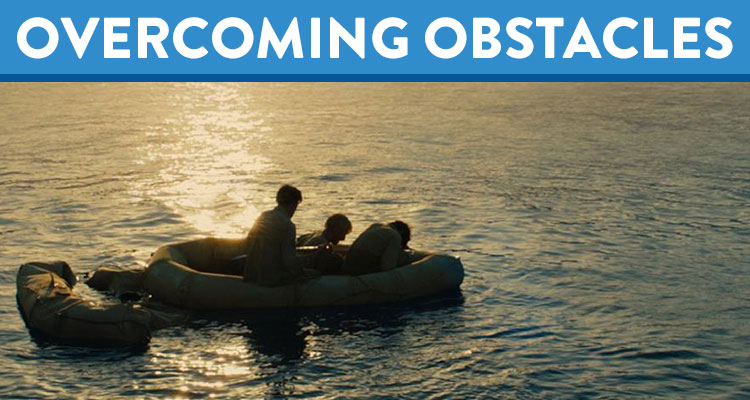This is one in a series of profiles on famous people who overcame incredible obstacles, failed many times or defied grim odds in order to succeed.
Initially, Louis Zamperini’s greatest obstacle was his own mortality. During World War II, his entire focus was on surviving, and the odds continued to be against him. He joined the Air Force in 1941 and was stationed on the Pacific as a bombardier on a B-24 Liberator bomber. At that time, flying into combat was only half the danger. Due to numerous technical problems and inadequate training, more than 50,000 airmen died in non-combat related accidents. So it was not unusual that Louis’ plane crashed into the ocean as he and his crewmates flew on a search and rescue mission for another plane that went down earlier.
What was unusual, however, was that Louis survived the crash and the subsequent 47 days on a raft. “The odds of being rescued if you ended up on a life raft were terrible,” Laura Hillenbrand, author of Zamperini’s biography Unbroken, told NPR in 2010. “The rafts were very poorly equipped.” Louis and his crewmate survived at sea longer than any other known survivors, drinking rainwater and eating the fish they managed to catch.
But his ordeal and struggle to survive had only just begun. Emaciated and weak from sitting in the lifeboat, Louis was discovered and captured by the Japanese and eventually sent to a brutal POW camp where he was beaten, starved and overworked. Due to his fame—he had competed in the 1936 Olympics and was one of the fastest distance runners in the world—a jealous and sadistic prison guard, Mutsuhiro Watanabe, whom the prisoners nicknamed “the Bird,” singled Louis out for particularly cruel treatment. These events are dramatized in the recent movie Unbroken, based on Hillenbrand’s best-selling book. Amazingly, he survived two years in the POW camps before being released when the war ended.
At last he went home—he was free and no longer living under the threat of death every day. But now he faced a new and unexpected obstacle, living with the trauma of the past two years and the inescapable memories of the brutal treatment he received. “Louis came home a deeply, deeply haunted man,” Hillenbrand says. Once his physical needs were finally met and the brutality of the war was over, Louis had to confront his feelings about what had happened to him. Every night he would wake up screaming from horrible nightmares about the cruel guard who had nearly killed him and tried to break his spirit. His thoughts would return to his horrific experiences and he would relive the beatings in his mind. Coping with the traumas of the past—what would now be diagnosed as Post Traumatic Stress Disorder (PTSD)—was an obstacle he had not prepared for. He began abusing alcohol and soon his marriage began to suffer (he married Cynthia Applewhite shortly after returning home).
Fortunately, true to his resilient spirit, Louis found ways to overcome this new obstacle, just as he overcame the odds during the war. The following are some of the ways that Louis overcame PTSD and went on to live nearly 70 more fruitful and happy years, free from the terrors of the past.
Faith
On the verge of divorce, Louis’ wife Cynthia convinced him to go with her to a Billy Graham Crusade near their home in Los Angeles. Louis was resistant at first. “I was resentful,” he said later. “I’d always been poisoned against such tent meetings since I was a youngster.” But he finally relented and the message clicked for him. It reminded him of a deal he had made with God while struggling to survive on the life raft and he began to believe that God had helped him survive. “That night when I got home from the Crusade, it was unbelievable,” he told the Billy Graham Evangelistic Association in a later interview. “I didn’t have a nightmare and I haven’t had one since.” His strong and immediate faith gave him a new sense of purpose and helped him with the next critical step in his healing process: forgiveness.
Forgiveness
Forgiveness is hard. Especially when it involves a truly heinous act, such as the cruel treatment “the Bird” continually inflicted on Louis. But experts encourage people to forgive offenses, even large ones, as forgiveness leads to better physical health, reduced anxiety and can prevent depression. “Prior to [Louis’] conversion his drinking was always self-medicating,” said Louis’ son, Luke Zamperini, in a recent interview with Townhall.com. “The real problem was his hatred for the Bird and former prison guards.” Louis’ faith taught him to forgive his enemies, so he decided to make an effort to forgive the Bird. Originally vowing to never return to Japan, Louis did visit a Tokyo prison in 1950 and forgave his former prison guards who were serving sentences for war crimes. He wanted to forgive Watanabe (the Bird) in person, but Watanabe, who was never prosecuted, refused his request. Instead, Louis wrote him a letter describing how Watanabe’s fierce treatment affected him and offering his forgiveness. “Love replaced the hate I had for you,” he wrote.
Hope
Louis’s war experiences seemed to defy hope. Survival appeared impossible during his ordeal on the raft and throughout his inhumane treatment as a POW. He lived with the knowledge that even if he could survive the prison camps, the Japanese guards had promised to kill all prisoners if Japan surrendered. It certainly seemed like a hopeless situation. Yet Louis maintained remarkable hope throughout it all. Hillenbrand writes that Louis’ hope on the raft actually helped him to survive. “Louie and Phil’s hope displaced their fear and inspired them to work toward their survival, and each success renewed their physical and emotional vigor,” she writes in her book. “Louie and Phil’s optimism, and Mac’s hopelessness, were becoming self-fulfilling.” According to Psychology Today, hope can affect all aspects of life, even academic achievement. “Cutting-edge science shows that hope, at least as defined by psychologists, matters a lot,” concludes author Scott Barry Kaufman, Ph.D. Louis’ resilient hope remained with him after the war, as he battled emotional and mental obstacles, rather than physical ones. He had hope for a future free from the torments of the past, so he did not give in to despair. “Where there’s still life, there’s still hope,” Louis wrote in his own autobiography.
Letting Go
Maybe one reason Disney’s Frozen anthem “Let it Go” was so overwhelmingly popular is that people resonated with the theme of letting go. Holding on to the fears and pain of the past only creates more pain. Despite the enormity of his past experiences, Louis found a way to let go of the past, which seemed to help him live a more enjoyable and fulfilling life after the war. It was not always that way, however. As Louis wrote in his letter to Watanabe, “As a result of my prisoner of war experience under your unwarranted and unreasonable punishment, my postwar life became a nightmare.” Despite all he had been through, it is his life immediately after the war that he describes as a “nightmare.” Until he could let go of his past trauma, his mind could not be free even though his body was. The World of Psychology blog points out that holding on to pain, hurt or anger from the past is counterproductive. “It’s not healthy, it adds to our stress, it hurts our ability to focus, study and work,” says founder Dr. John Grohol, Psy.D., “and it impacts every other relationship we have (even the ones not directly affected by the hurt).”
Louis Zamperini could not overcome the enormity of the suffering and challenges he experienced during the war until he learned to overcome the challenge of his post-traumatic stress after the war, which he did with extraordinary speed and effectiveness. Having overcome this mental and emotional obstacle, Louis went on to become a successful inspirational speaker, he started a camp for troubled youth, and he carried the Olympic Torch relay for the Winter Olympics in Nagano, Japan.
Image Credit – Universal Pictures






















































































































